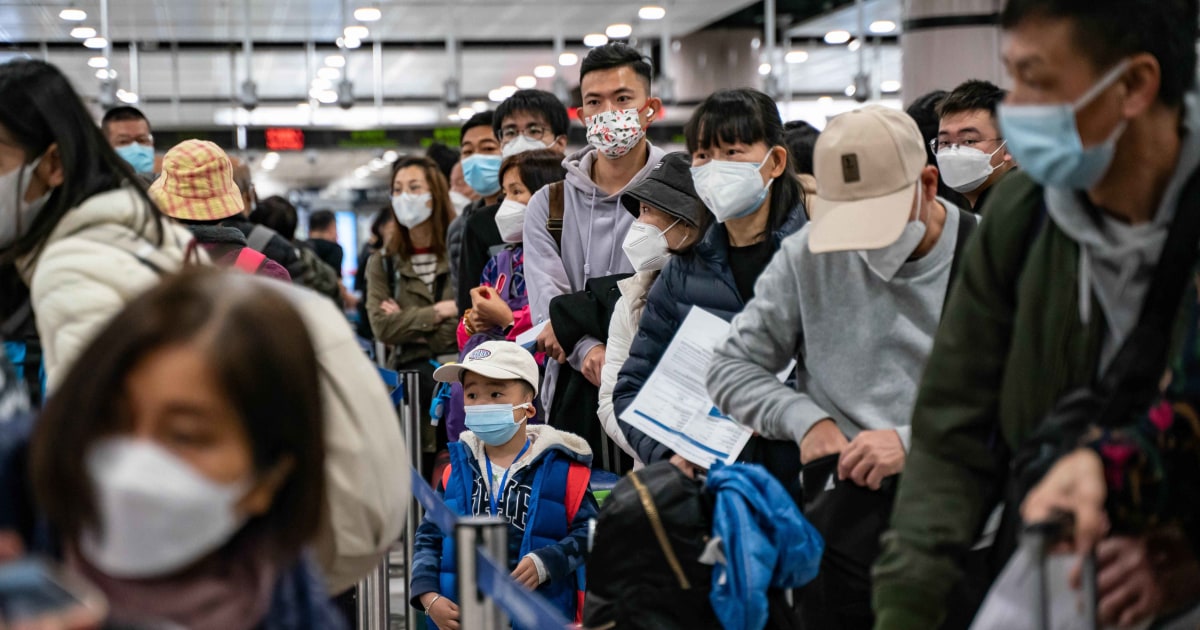HONG KONG — On the first day of seamless travel between mainland China and Hong Kong, Olivia Gai was one of the first in line.
Crossing the border from the Chinese territory of Hong Kong to the mainland had been a hassle since the start of the covid-19 pandemic, requiring weeks of quarantine. But this time it was smooth and fast, said Gai, 27, who works in wealth management.
When he entered the mainland city of Shenzhen, «I saw two extremely festive display boards, and the staff said that you can write a wish and put it up, a lot of people were writing and taking photos,» Gai said via Xiaohongshu, China’s version of Instagram. . . «I was about to cry at that point.»
China reopened to the world on Sunday after three years of lockdown, ending quarantine requirements for incoming travelers and issuing tourist passports to its citizens again. The hasty lifting of «covid zero» restrictions after mass protests has accelerated what appears to be the worst outbreak of the pandemic in China, prompting the United States and many other governments to impose restrictions on travelers from the second largest economy in the world.
The United States, the World Health Organization and others have said that China is not being transparent about the extent of its outbreak and that a lack of information increases the risk of a new outbreak. worry variant emerging undetected.
China, in turn, criticized the new tests and other requirements as unscientific and discriminatory, threatening countermeasures. On Tuesday, the Chinese embassies in South Korea and Japan said they would stop issuing short-term visas for travelers to China.
«Once again, we call on relevant countries to ensure that their COVID response measures are based on facts, science and proportionate,» Foreign Ministry spokesman Wang Wenbin said on Tuesday. , in a regular press conference. China itself still requires all arriving passengers to test negative for the virus within 48 hours of leaving their points of origin.
Social media users in China have expressed anger over strict border measures in South Korea, sharing videos of travelers from China wearing yellow cards around their necks and being escorted for testing upon arrival by South Korean soldiers in uniform. The Korea Agency for Disease Control and Prevention told NBC News that soldiers were asked to help in the rush to implement the new arrival procedures and that trained quarantine staff would help travelers from China find the area. test starting Wednesday.
The South Korean Foreign Ministry says its restrictions on travelers from China are based on science. Japan said on Wednesday that it had lodged a protest with China over the visa suspension.
The United States and other countries imposing restrictions have cited a lack of data from China, which is a «black box» when it comes to its current Covid outbreak, said Ho-fung Hung, an associate professor of sociology at Johns Hopkins University.
The country, which strictly defines Covid-related deaths, has reported only about three dozen in the past month, a number that is out of sync with anecdotal reports and social media images of overwhelmed crematoriums and funeral homes. By some estimates, China’s Covid death toll could hit 1 million or more in the coming months.
The government’s low official case numbers are also at odds with local reports. A spokesman for the Henan provincial government said on Monday that as of January 6, 89% of the province’s 99 million people were infected. The number of patients visiting «fever clinics» for treatment has continuously decreased since it peaked on December 19, the spokesman said.
Experts including Hung says the Chinese government itself may not have exact numbers, especially as mass testing programs have ended and many people with mild infections are recovering at home without reporting them.
“It is challenging to collect this data accurately in the context of an acute epidemic,” said Karen Grépin, an associate professor at the University of Hong Kong School of Public Health.
Chinese officials reject claims that they have not shared information transparently. They say the outbreak is predictable and under control, and life is returning to normal in cities and provinces where cases have already peaked.
Nonetheless, more countries have begun to require negative covid tests for travelers from China, and at least one country, Morocco, has banned arrivals entirely.

